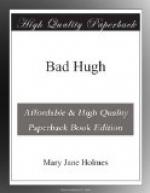To a certain extent this was true, for John Stanley would have felt sadly out of place in any spot where, as Chloe said, “his things were not lying round loose and handy,” and as habit is everything, so Hugh soon grew accustomed to his surroundings, and became as careless of his external appearance as his uncle could desire. Only once had there come to him an awakening—a faint conception of the happiness there might arise from constant association with the pure and refined, such as his uncle had labored to make him believe did not exist. He was thinking of that incident now, and as he thought the veins upon his broad, white forehead stood out round and full, while the hands clasped above the head worked nervously together, and it was not strange that he did not heed his mother when she spoke, for Hugh was far away from Spring Bank, and the wild storm beating against its walls was to him like the sound of the waves dashing against the vessel’s side, just as they did years ago on that night he remembered so well, shuddering as he heard again the murderous hiss of the devouring flames, covering the fatal boat with one sheet of fire, and driving into the water as a safer friend the shrieking, frightened wretches who but an hour before had been so full of life and hope, dancing gayly above the red-tongued demon stealthily creeping upward from the hold below, where it had taken life. What a fearful scene that was, and the veins grew larger on Hugh’s brow while his broad chest heaved with something like a stifled sob as he recalled the little childish form to which he had clung so madly until the cruel timber struck from him all consciousness, and he let that form go down—down ’neath the treacherous waters of Lake Erie never to come up again alive, for so his uncle told when, weeks after the occurrence, he awoke from the delirious fever which ensued and listened to the sickening detail.
“Lost, my boy, lost with many others,” was what his uncle had said.
He heard the words as plainly now as when they first were spoken, remembering how his uncle’s voice had faltered, and how the thought had flashed upon his mind that John Stanley’s heart was not as hard toward womenkind as people had supposed. “Lost”—there was a world of meaning in that word to Hugh more than any one had ever guessed, and, though it was but a child he lost, yet in the quiet night, when all else around Spring Bank was locked in sleep, he often lay thinking of that child and of what he might perhaps have been had she been spared to him. He was thinking of her now, and as he thought visions of a sweet, pale face, shadowed with curls of golden hair, came up before his mind, and he saw again the look of bewildered surprise and pain which shone in the soft, blue eyes and illumined every feature when in an unguarded moment he gave vent to the half infidel principles he had learned from his uncle. Her creed was different from his, and she explained it to him so earnestly,




